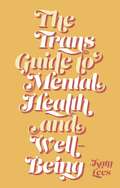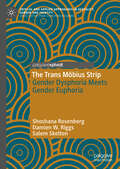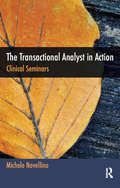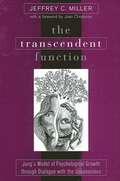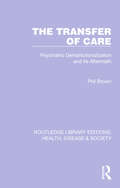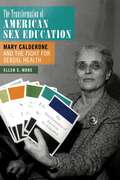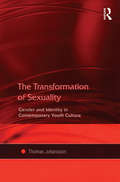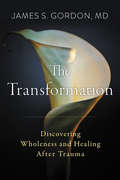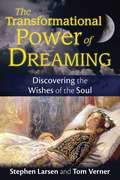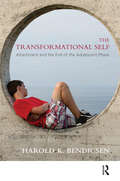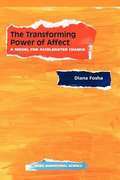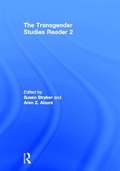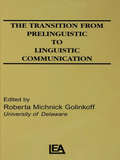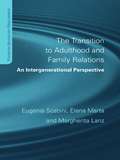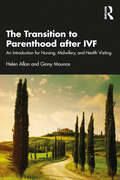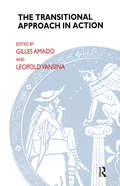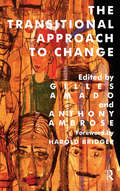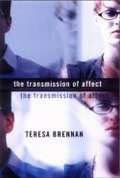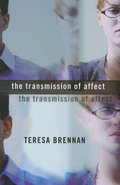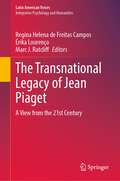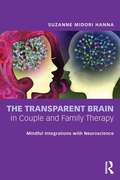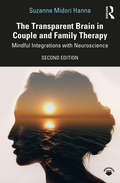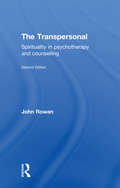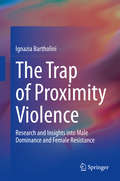- Table View
- List View
The Trans Guide to Mental Health and Well-Being
by Katy Lees'The resource trans people need right now' MEG-JOHN BARKER'An excellent book' JOS TWIST'Straightforward and accessible' JENNIE KERMODEThis empowering self-help guide provides advice and strategies for trans and/or non-binary people on a range of common mental health issues including anxiety, depression, body image, trauma, suicidal thoughts and dissociation. It provides advice on neutralising negative thoughts, coping with transphobia, coming out, dealing with imposter syndrome, and implementing achievable self-care strategies and mindfulness techniques.Whether you are in a crisis or just looking for ways to improve your life, this reassuring guide is there for you to use in the way that helps you the most, regardless of where you are in your transition, or if you decide not to transition in conventional ways. Combining therapeutic expertise alongside first-hand experience, the book also highlights the importance of understanding and being proud of who you are, to help you live life to the fullest.
The Trans Möbius Strip: Gender Dysphoria Meets Gender Euphoria (Critical and Applied Approaches in Sexuality, Gender and Identity)
by Damien W. Riggs Shoshana Rosenberg Salem SkeltonThis book explores the histories and presents of gender dysphoria and euphoria as clinical and theoretical concepts as well as lived experience. It outlines how euphoria emerged as a concept, what its relationship to dysphoria is, and how it shows up in the body, in relationships, and as a framework for liberation. Using the concept of the Möbius Strip as an explanatory model of the interconnectedness of gender, the authors explore how gender as a concept encompasses multiplicity, duality, and non-linearity despite its supposed singularity. Rather than viewing euphoria and dysphoria as two poles of a continuum, this volume introduces the notion that they are in fact a blended experience which oscillates between distinctiveness and relationality. Critically engaging with clinical theory, gender studies, crip theory, spirituality, and political movements, this book is ideal for academics from a variety of fields, including psychology, sociology, gender studies, trans studies, cultural studies, as well as practitioners and clinicians, especially those who work with trans people.
The Transactional Analyst in Action: Clinical Seminars
by Michele NovellinoThis book represents a synthesis of more than thirty years dedicated to the spreading and teaching of transactional analysis, and will be useful to students, directors and professors of the schools of transactional analysis, and also to therapists of other schools, providing an up-to-date and complete idea of the current state of the analytic transactional methodology. The handbook describes the epistemological and methodological roots for a well-grounded psychotherapy with transactional analysis (TA): differences among method, methodology, therapeutic plan, and strategy and technique are all illustrated. TA is presented as a phenomenological branch of modern relational psychoanalysis. Transference and counter-transference are reconsidered in a Bernean perspective. The four strategic phases of alliance, decontamination, deconfusion, and relearning are presented, together with the well-known techniques of the eight Bernean therapeutic operations, two and three-chairs work, redecision technique, and dream-work.
The Transcendent Function: Jung's Model of Psychological Growth through Dialogue with the Unconscious
by Jeffrey C. MillerThe transcendent function is the core of Carl Jung's theory of psychological growth and the heart of what he called individuation, the process by which one is guided in a teleological way toward the person one is meant to be. This book thoroughly reviews the transcendent function, analyzing both the 1958 version of the seminal essay that bears its name and the original version written in 1916. It also provides a word-by-word comparison of the two, along with every reference Jung made to the transcendent function in his written works, his letters, and his public seminars.
The Transfer of Care: Psychiatric Deinstitutionalization and Its Aftermath (Routledge Library Editions: Health, Disease and Society #7)
by Phil BrownOriginally published in 1985, this book provides a comprehensive analysis of mental health policy and practice in the USA during the latter part of the 20th Century by focussing on 3 main themes: political-economic structures, the pitfalls of professionalism and institutional obstacles to adequate care.
The Transformation of American Sex Education: Mary Calderone and the Fight for Sexual Health
by Ellen S. MoreA comprehensive history of the battle over sex education in the United StatesMid-century America had a problem talking about sex. Dr. Mary Calderone first diagnosed this condition and, in 1964, led the uphill battle to de-stigmatize sex education. Supporters hailed her as the “grandmother of modern sex education” while her detractors painted her as an “aging libertine,” but both could agree that she was quickly shaping the way sex was discussed in the classroom. Part biography, part social history, The Transformation of American Sex Education for the first time situates Dr. Mary Calderone at the center of decades of political, cultural, and religious conflict in the fight for comprehensive sex education. Ellen S. More examines Americans’ attempts to come to terms with the vexed subject of sex education in schools from the late 1940s to the early twenty-first century. Using Mary Calderone’s life and career as a touchstone, she traces the origins of modern sex education in the United States from the work of a group of reformers who coalesced around Calderone to create the Sexuality Information and Education Council of the United States (SIECUS) in 1964, to the development and use of the competing approaches known as “abstinence-based” and “comprehensive” sex education from the 1980s into the twenty-first century. A fascinating and timely read, The Transformation of American Sex Education provides a substantial contribution to the history of one of America’s most intense and protracted culture wars, and the first account of the woman who fought those battles.
The Transformation of Sexuality: Gender and Identity in Contemporary Youth Culture
by Thomas JohanssonHow do contemporary young people construct their sexual identities? Are young people sexually liberated, or is human sexuality increasingly controlled and manipulated by commercial forces? Thomas Johansson explores the construction of sexual identities by young people as part of a wider process of identity construction, combining the work of key authors such as Elias and Foucault with original and revealing empirical material drawn from an extensive survey of the views of 1300 sixteen to nineteen year olds, combined with a number of qualitative in-depth interviews with different sexual subcultures. Topics covered include fidelity and infidelity, love, homosexuality, pornography and beauty ideals. Designed to look beyond media images and popular prejudices the book illustrates how young people of both genders, of different nationalities and of different group allegiances view and relate to their own sexuality.
The Transformation: Discovering Wholeness and Healing After Trauma
by James S. Gordon M.D.A world-recognized authority and acclaimed mind-body medicine pioneer presents the first evidence-based program to reverse the psychological and biological damage caused by trauma.In his role as the founder and director of The Center for Mind-Body Medicine (CMBM), the worlds largest and most effective program for healing population-wide trauma, Harvard-trained psychiatrist James Gordon has taught a curriculum that has alleviated trauma to populations as diverse as refugees and survivors of war in Bosnia, Kosovo, Israel, Gaza, and Syria, as well as Native Americans on the Pine Ridge Reservation in South Dakota, New York city firefighters and their families, and members of the U. S. military. Dr. Gordon and his team have also used their work to help middle class professionals, stay-at-home mothers, inner city children of color, White House officials, medical students, and people struggling with severe emotional and physical illnesses. The Transformation represents the culmination of Dr. Gordon’s fifty years as a mind-body medicine pioneer and an advocate of integrative approaches to overcoming psychological trauma and stress. Offering inspirational stories, eye-opening research, and innovative prescriptive support, The Transformation makes accessible for the first time the methods that Dr. Gordon—with the help of his faculty of 160, and 6,000 trained clinicians, educators, and community leaders—has developed and used to relieve the suffering of hundreds of thousands of adults and children around the world.
The Transformational Power of Dreaming: Discovering the Wishes of the Soul
by Stephen Larsen Tom VernerAn exploration of dreaming history, science, traditions, and practices from prehistory to today• Examines ancient dream traditions from around the world, shamanic dreaming, and the profound role of dreaming in Native American and African-American cultures• Investigates dream psychology and the neuroscience of the dreaming brain• Explores the practice of dream incubation, lucid dreaming, and telepathic dreaming with tips on remembering your dreams and working with themWe have been dreaming for all of our 3 million or more years of existence. Dreams provide an extraordinary way to process the day’s events and uncover new perspectives. Many cultural creatives credit their world-changing creations to their dreams, and science now believes that dreams helped evolve the very process of thought itself.In this book, Stephen Larsen and Tom Verner examine dream traditions from around the world, beginning with the oldest records from ancient Egypt, India, Greece, and Australia and expanding to shamanic and indigenous societies. The authors investigate the psychology of dreaming, the neuroscience behind the dreaming brain, the Jungian perspective, and the intersections of yoga and modern dream research. They show how dreams and myth are related in the timeless world of the Archetypal Imagination and how dreams often reveal the wishes of the soul. They explore the practice of dream incubation, an age-old tradition for seeding the unconscious mind to help solve problems and gain deep insights. They examine the profound role that dreams have played in the survival of exploited and persecuted cultures, such as the Native Americans, African slaves, and the Jews during the Holocaust, and share inspirational dream stories from exceptional woman dreamers such as Hildegard von Bingen, Joan of Arc, and Harriet Tubman.Drawing on their more than 50 years’ experience keeping dream journals, the authors offer techniques to help you remember your dreams and begin to work with them. They also explore the clairvoyant and telepathic dimensions of dreaming and the practices of lucid dreaming and shamanic dreaming. Revealing how the alchemical cauldron of dreaming can bring inspiration, healing, and discovery, the authors show how dreams unite us with each other and the past and future dreamers of our world.
The Transformational Self: Attachment and the End of the Adolescent Phase
by Harold K. BendicsenThis book is an attempt to add to the theoretical discussion regarding the nature of the intrapsychic and interpersonal transformational changes associated with the transition from adolescence to young adulthood. The author introduces the concept of the 'Transformational Self', a phase-specific dimension of the neural self, and demonstrates the enhanced explanatory power that it offers in attempting to examine the sometimes dramatic shifting self-states accompanying the metamorphosis from adolescence into young adulthood. A necessary precondition for the emergence of the Transformational Self is the maturation of the pre-frontal cortex and its enhanced neural connectivity. With this biological achievement, executive functioning, a strengthened ego/self capacity, can arrive at a mature level of external stabilization and internal, intrapsychic structuralization. Conceptualized in self-referencing metaphor and expressed and reinforced through long term potentiation (repeated firing patterns of synchronous neural assemblies), the late adolescent reconfigured self-state becomes a true developmental potentiality evidenced by the use of different self (and other) representations.
The Transformative Mind
by Anna StetsenkoThe book suggests a transition from a relational worldview premised on the socio-political ethos of adaptation towards a transformative worldview premised on the ethos of solidarity and equality. Expansively developing Vygotsky's revolutionary project, the Transformative Activist Stance integrates insights from a vast array of critical and sociocultural theories and pedagogies and moves beyond their impasses to address the crisis of inequality. This captures the dynamics of social transformation and agency in moving beyond theoretical and political canons of the status quo. The focus is on the nexus of people co-creating history and society while being interactively created by their own transformative agency. Revealing development and mind as agentive contributions to the 'world-in-the-making' from an activist stance guided by a sought-after future, this approach culminates in implications for research with transformative agendas and a pedagogy of daring. Along the way, many key theories of mind, development and education are challenged and radically reworked.
The Transforming Power Of Affect: A Model For Accelerated Change
by Diana FoshaThe first model of accelerated psychodynamic therapy to make the theoretical why as important as the formula for how, Fosha's original technique for catalyzing change mandates explicit empathy and radical engagement by the therapist to elicit and harness the patient's own healing affects. <P><P>Its wide-open window on contemporary relational and attachment theory ushers in a safe, emotionally intense, experience-based pathway for processing previously unbearable feelings. This is a rich fusion of intellectual rigor, clinical passion, and practical moment-by-moment interventions.
The Transgender Studies Reader 2
by Susan Stryker Aren AizuraOver the past twenty years, transgender studies has emerged as a vibrant field of interdisciplinary scholarship. In 2006, Routledge's The Transgender Studies Reader brought together the first definitive collection of the field. Since its publication, the field has seen an explosion of new work that has expanded the boundaries of inquiry in many directions. The Transgender Studies Reader 2 gathers these disparate strands of scholarship, and collects them into a format that makes sense for teaching and research. Complementing the first volume, rather than competing with it, The Transgender Studies Reader 2 consists of fifty articles, with a general introduction by the editors, explanatory head notes for each essay, and bibliographical suggestions for further research. Unlike the first volume, which was historically based, tracing the lineage of the field, this volume focuses on recent work and emerging trends. To keep pace with this rapidly changing area, the second reader has a companion website, with images, links to blogs, video, and other material to help supplement the book. For more information, visit the companion website at www. routledge. com/cw/stryker
The Transition From Prelinguistic To Linguistic Communication
by Roberta Michnick GolinkoffPublished in the year 1983, The Transition From Prelinguistic To Linguistic Communication is a valuable contribution to the field of Developmental Psychology.
The Transition to Adulthood and Family Relations: An Intergenerational Approach (Studies in Adolescent Development)
by Eugenia Scabini Elena Marta Margherita LanzThis book explores the development of a new path of transition between adolescence and adulthood in recent generations. Whereas traditionally the transition into adulthood was marked by a clear and irreversible change in condition, we are now seeing a continuance in the role and influence of the family on the young adult. What consequences does this have for our society? Is the persistence of emotional bonds which previously loosened during adolescence, inhibiting young people from developing into full adulthood? The authors present a clear and in-depth analysis of the theoretical framework surrounding the transition into adulthood both from a generational point of view and a relationship-centred perspective. The findings of international research are presented and compared across generations, gender and geographical location within Europe. The different research methods of ‘family related research’ and ‘family research’ are also distinguished and analysed. This volume offers an original and multi-faceted review of this topic. The family is considered as an organization, and the interdependencies and interconnections between its members, the generations and genders investigated. It offers a unique contribution to the current literature and will appeal to an international audience of researchers, policy makers and educators both in academic and professional spheres.
The Transition to Parenthood after IVF: An Introduction for Nursing, Midwifery and Health Visiting
by Helen Allan Ginny MounceThis book explores how experiences of IVF can affect the transition to parenthood for non-donor infertile couples. Drawing on empirical research and the broader social sciences literature, the book sets out the context of complex modern family building and discusses how infertility and IVF continue to shape parenthood and family building after successful IVF conception. It looks at how stigma, disclosure, loss, and gender affect the transition to parenthood, as well as what happens when parents start thinking about trying for siblings. We highlight the key roles for health care professionals (nurses, midwives, and health visitors) when caring for these new parents, in providing social support and facilitating good communication to foster emotional well-being. Ideal for nurses and midwives working in reproductive health as well as primary care nurses and health visitors, this applied text is a key reference for all healthcare professionals who meet people at any point on their journey to achieving pregnancy through IVF, during maternity care, and through the first few years of parenthood.
The Transitional Approach in Action (The Harold Bridger Transitional Series)
by Leopold Vansina Gilles AmadoThe chapters in this volume cover a wide range of topics that concentrate around four themes: transitional change in therapeutic communities; in working conferences for professional development or training; in organisation consulting with an emphasis on organisational learning; and in self studies of working systems in action. In all these psychic activities, "time and space" were created to allow for transitional processes to become alive. A therapist, a manager, a consultant or a layman may create conditions that facilitate or hinder human beings to become engaged in these normal, healthy processes, but the persons concerned undertake the basic psychic work.'It is encouraging to notice that more and more clinical institutions, organisations and even professional associations are becoming aware of the important and complex interactions between psychic processes and organisational realities. The engagement in transitional processes, however, demands courage. Courage that is proper to any pursuit of truth and social justice. At times, this search generates excitement, at other times we become scared by the realities we discover.
The Transitional Approach to Change (The Harold Bridger Transitional Series)
by Gilles Amado Eric Trist Anthony Ambrose Rachel Amato Harold BridgerBringing together several different facets of what is termed "the transitional approach", it will be valued by consultants, management students, practitioners and all those who want to gain a deeper understanding of the processes of organisational change. It will also be a highly welcome addition to the currently available literature that aims to provide a deeper understanding of society. This book is designed to stimulate, encourage and facilitate the transitional process in people to the benefit of themselves and the social systems in which they are invoved.
The Transmission of Affect
by Teresa BrennanThe idea that one can soak up someone else's depression or anxiety or sense the tension in a room is familiar. Indeed, phrases that capture this notion abound in the popular vernacular: "negative energy," "dumping," "you could cut the tension with a knife. " The Transmission of Affect deals with the belief that the emotions and energies of one person or group can be absorbed by or can enter directly into another. The ability to borrow or share states of mind, once historically and culturally assumed, is now pathologized, as Teresa Brennan shows in relation to affective transfer in psychiatric clinics and the prevalence of psychogenic illness in contemporary life. To neglect the mechanism by which affect is transmitted, the author claims, has serious consequences for science and medical research. Brennan's theory of affect is based on constant communication between individuals and their physical and social environments. Her important book details the relationships among affect, energy, and "new maladies of the soul," including attention deficit disorder, chronic fatigue syndrome, codependency, and fibromyalgia.
The Transmission of Affect
by Teresa BrennanThe idea that one can soak up someone else's depression or anxiety or sense the tension in a room is familiar. Indeed, phrases that capture this notion abound in the popular vernacular: "negative energy," "dumping," "you could cut the tension with a knife." The Transmission of Affect deals with the belief that the emotions and energies of one person or group can be absorbed by or can enter directly into another. The ability to borrow or share states of mind, once historically and culturally assumed, is now pathologized, as Teresa Brennan shows in relation to affective transfer in psychiatric clinics and the prevalence of psychogenic illness in contemporary life. To neglect the mechanism by which affect is transmitted, the author claims, has serious consequences for science and medical research. Brennan's theory of affect is based on constant communication between individuals and their physical and social environments. Her important book details the relationships among affect, energy, and "new maladies of the soul," including attention deficit disorder, chronic fatigue syndrome, codependency, and fibromyalgia.
The Transnational Legacy of Jean Piaget: A View from the 21st Century (Latin American Voices)
by Marc J. Ratcliff Regina Helena de Freitas Campos Érika LourençoThis book presents a collection of studies on the circulation of Jean Piaget’s ideas and works between Europe and Latin America, and how this transnational legacy influenced different fields of research and practice, such as psychology, education and philosophy. The volume brings together contributions presented at the International Colloquium Jean Piaget in Brazil and Latin America, held during the 38th Annual Helena Antipoff Meeting, organized by the Federal University of Minas Gerais, Brazil, in collaboration with the University of Geneva, Switzerland. The book is organized in three parts. Chapters in the first part analyze Piaget’s role as a builder of an international network in psychology, education and peace promotion in the 20th century, with a special focus on the circulation of his ideas and works between Switzerland and France. The second part focuses on historical and contemporary dialogues, conflicts and controversies between Piaget and other authors, such as Henri Wallon, Carl Rogers, Jürgen Habermas, and, especially, Helena Antipoff, the Russian-Brazilian psychologist and educator who was one of the first researchers to introduce Piaget in Brazil and to establish a bridge between Latin America and the Geneva school of psychological and educational sciences. Finally, chapters in the third part of the book explore different aspects of the reception and appropriation of Piaget’s works and ideas in the Brazilian context. The Transnational Legacy of Jean Piaget: A View from the 21st Century will be of interest to researchers in different fields within the human and social sciences, such as developmental, educational and school psychologists; educators; philosophers and historians of psychology and education interested in understanding how Piaget’s progressist ideas have contributed to the development of psychological and educational sciences in Europe and Latin America. Some chapters of this book were originally written in Portuguese and French and translated into English with the help of artificial intelligence. A subsequent human revision was done primarily in terms of content.
The Transparent Brain in Couple and Family Therapy: Mindful Integrations with Neuroscience
by Suzanne Midori HannaWhy should family therapists care about brain research? Are there invisible connections between the breakdown of our relationships and the breakdown of our cells? To answer these questions, author Suzanne Hanna paints pictures of ancient principles coming together with contemporary research as a context for why basic concepts of neuroscience are relevant to couple and family therapy. She illustrates the reciprocal nature of the body and relationships in a book that simplifies and demystifies brain science for therapists. Using the latest findings from affective and cognitive neuroscience, she highlights 6 brain-friendly family therapy approaches and introduces the concept of biological empathy. This analysis enables practitioners to harness the power of mindfulness toward brain development and interpersonal healing. Client-friendly language allows busy therapists to educate without jargon. Applications of family therapy begin with the self of the therapist and advance through the interpersonal layers of attachment, pair-bonding, and community. Chapters include topics on:• Whole body awareness• A narrative approach to neuroanatomy and physiology • 5 basic principles of neuroscience• Basics of trauma treatment• Male/female brain differences in couples therapy• The ancient concept of tribe and a community frontal lobeEach chapter summarizes with principles and guidelines for clinicians. Numerous illustrations make the brain transparent, while surveys, worksheets, and tables make therapeutic process transparent. The last chapter illustrates concepts and interventions through a full-length case story and applies addiction treatment as a case study for program development. The Transparent Brain includes case examples from all walks of life, highlighting heroic acts of survival. Clinicians can use 5 basic principles of neuroscience to bring relief more quickly, for more people from more diverse backgrounds. It is a revolutionary read and a must-have reference for any mental health professional.
The Transparent Brain in Couple and Family Therapy: Mindful Integrations with Neuroscience
by Suzanne Midori HannaBringing together clinical expertise with the latest findings from social, affective, and cognitive neuroscience, this accessible guide outlines how basic concepts of neuroscience and family therapy can be highly relevant to all mental health treatment. This expanded second edition includes content on a range of areas including effects of racism, poverty, violence, and childhood abuse on the brain; substance abuse; and advances in the treatment of depression, bipolar disorder, and anxiety. Grounded in five key tenets of neuroscience, the approaches highlighted in this book focus on the safety of secure bonds for children, adolescents, couples, and families, as well as how an understanding of neuroscience can be utilized by professionals during trauma therapy. The stages of brain development provide a map for practitioners that illustrates dozens of practical, daily interventions. Chapters discuss neuroscience in light of a range of contemporary dilemmas for client engagement, accompanied throughout by fresh case examples, worksheets, clinical guidelines, and step-by-step interventions. Written in a jargon-free style, The Transparent Brain in Couple and Family Therapy, second edition is an essential resource for mental health professionals using neuroscientific principles to bring relief to clients from diverse backgrounds.
The Transpersonal: Spirituality in Psychotherapy and Counselling
by John RowanIn this new edition of The Transpersonal, John Rowan takes account of the growing interest in spirituality, assessing the many new developments in the field and providing an essential overview of the multitude of guides now available on the subject. By providing a clear and highly readable introduction to the realm of the transpersonal, this book eliminates many of the misunderstandings that plague this area. It relates the transpersonal to everyday life as well as to professional concerns and the various schools of therapy. Divided into three parts, Being, Doing and Knowing, it encourages the reader to explore the levels of consciousness, the techniques involved in transpersonal work and the underlying theory. The unique relationship between the therapist and client is examined in detail, as are the imagined and imaginal world, personal mythology and transcultural work. An entirely new section is included on the ways in which the transpersonal therapist can use the concept of subpersonalities. This fully updated and revised version of John Rowan's original pioneering text provides a highly practical guide which will be useful to anyone working with the growing number of people with spiritual concerns.
The Trap of Proximity Violence: Research and Insights into Male Dominance and Female Resistance
by Ignazia BartholiniThis book aims at shifting the emphasis from a general vision of gender-based violence to a more opaque, yet equally destructive one, that related to "proximity violence".The first type of violence is exercised in multiple situations and in the generality of relationships experienced by people involving others who are both strangers to and intimate with each other. Proximity violence provides and includes a fiduciary kind of "proximity", of "dependent intimacy", where the trust that the victim places in the other (her tormentor) favours the exercise of violence itself, allowing it to take place, thus making it practically imperceptible when not actually normal, in extreme cases.In turn, this confidence is comparable to "a veil of Maja" which, in conditions of vulnerability typical of victims, attenuates the consequences of the violence undergone or the omens of what becomes violent action.The conceptual triad: proximity violence, vulnerability, resistance-resilience is explored here, in the three main chapters and in the details aimed at identifying, in the final chapter, the mutual interconnections. This book will be of particular interest and use to undergraduate and graduate students of sociology and gender studies
